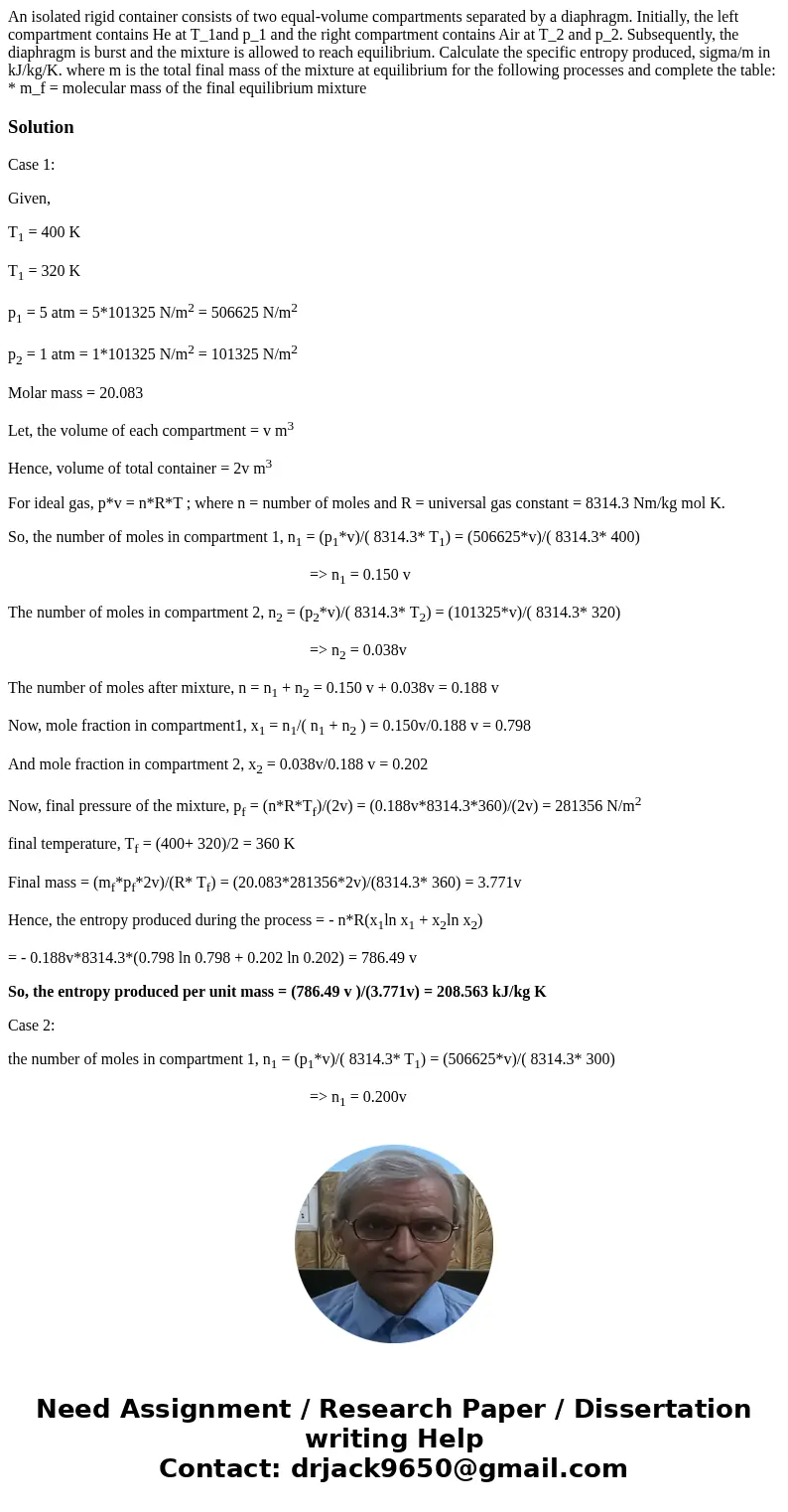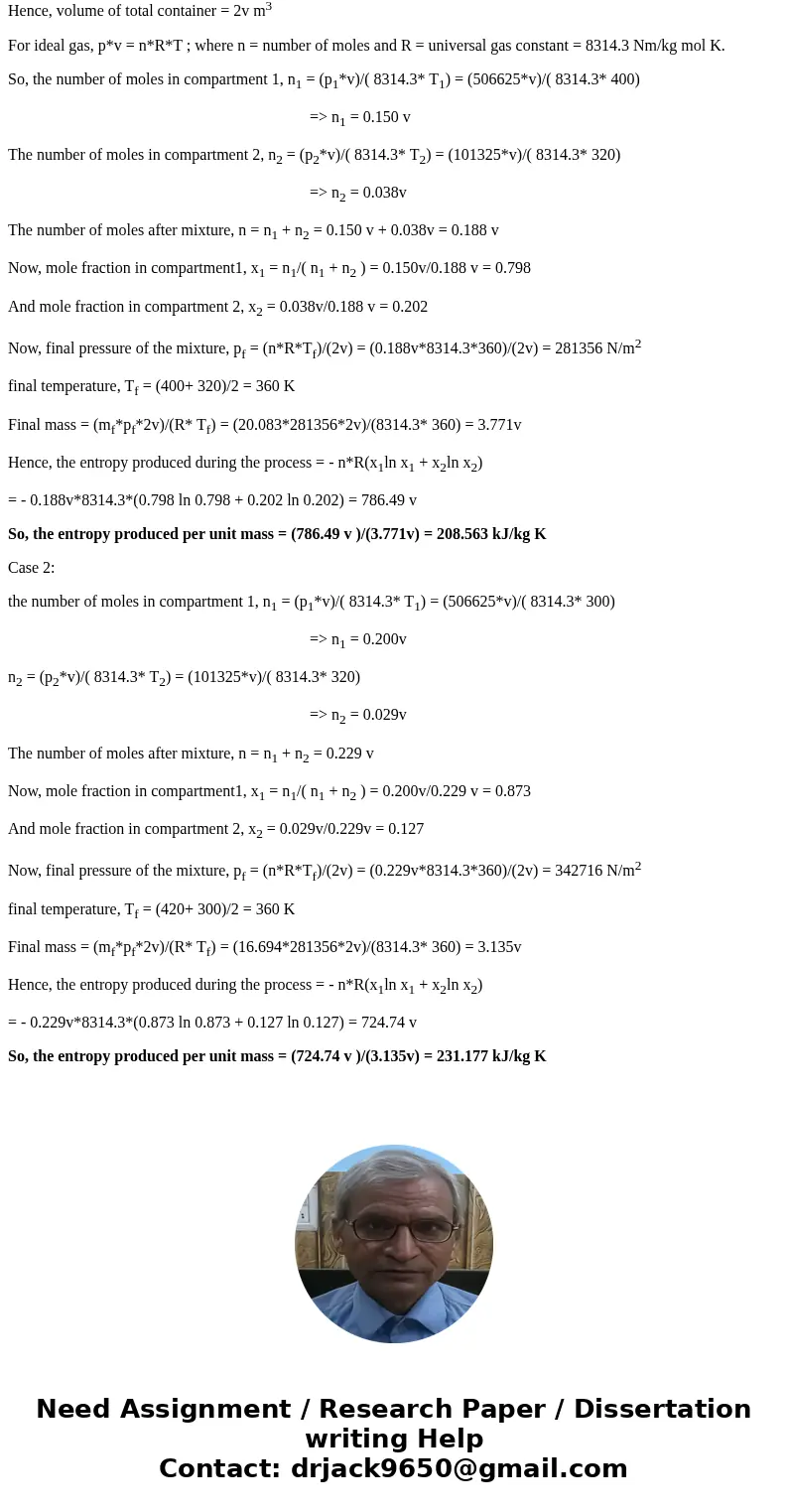An isolated rigid container consists of two equalvolume comp
Solution
Case 1:
Given,
T1 = 400 K
T1 = 320 K
p1 = 5 atm = 5*101325 N/m2 = 506625 N/m2
p2 = 1 atm = 1*101325 N/m2 = 101325 N/m2
Molar mass = 20.083
Let, the volume of each compartment = v m3
Hence, volume of total container = 2v m3
For ideal gas, p*v = n*R*T ; where n = number of moles and R = universal gas constant = 8314.3 Nm/kg mol K.
So, the number of moles in compartment 1, n1 = (p1*v)/( 8314.3* T1) = (506625*v)/( 8314.3* 400)
=> n1 = 0.150 v
The number of moles in compartment 2, n2 = (p2*v)/( 8314.3* T2) = (101325*v)/( 8314.3* 320)
=> n2 = 0.038v
The number of moles after mixture, n = n1 + n2 = 0.150 v + 0.038v = 0.188 v
Now, mole fraction in compartment1, x1 = n1/( n1 + n2 ) = 0.150v/0.188 v = 0.798
And mole fraction in compartment 2, x2 = 0.038v/0.188 v = 0.202
Now, final pressure of the mixture, pf = (n*R*Tf)/(2v) = (0.188v*8314.3*360)/(2v) = 281356 N/m2
final temperature, Tf = (400+ 320)/2 = 360 K
Final mass = (mf*pf*2v)/(R* Tf) = (20.083*281356*2v)/(8314.3* 360) = 3.771v
Hence, the entropy produced during the process = - n*R(x1ln x1 + x2ln x2)
= - 0.188v*8314.3*(0.798 ln 0.798 + 0.202 ln 0.202) = 786.49 v
So, the entropy produced per unit mass = (786.49 v )/(3.771v) = 208.563 kJ/kg K
Case 2:
the number of moles in compartment 1, n1 = (p1*v)/( 8314.3* T1) = (506625*v)/( 8314.3* 300)
=> n1 = 0.200v
n2 = (p2*v)/( 8314.3* T2) = (101325*v)/( 8314.3* 320)
=> n2 = 0.029v
The number of moles after mixture, n = n1 + n2 = 0.229 v
Now, mole fraction in compartment1, x1 = n1/( n1 + n2 ) = 0.200v/0.229 v = 0.873
And mole fraction in compartment 2, x2 = 0.029v/0.229v = 0.127
Now, final pressure of the mixture, pf = (n*R*Tf)/(2v) = (0.229v*8314.3*360)/(2v) = 342716 N/m2
final temperature, Tf = (420+ 300)/2 = 360 K
Final mass = (mf*pf*2v)/(R* Tf) = (16.694*281356*2v)/(8314.3* 360) = 3.135v
Hence, the entropy produced during the process = - n*R(x1ln x1 + x2ln x2)
= - 0.229v*8314.3*(0.873 ln 0.873 + 0.127 ln 0.127) = 724.74 v
So, the entropy produced per unit mass = (724.74 v )/(3.135v) = 231.177 kJ/kg K


 Homework Sourse
Homework Sourse